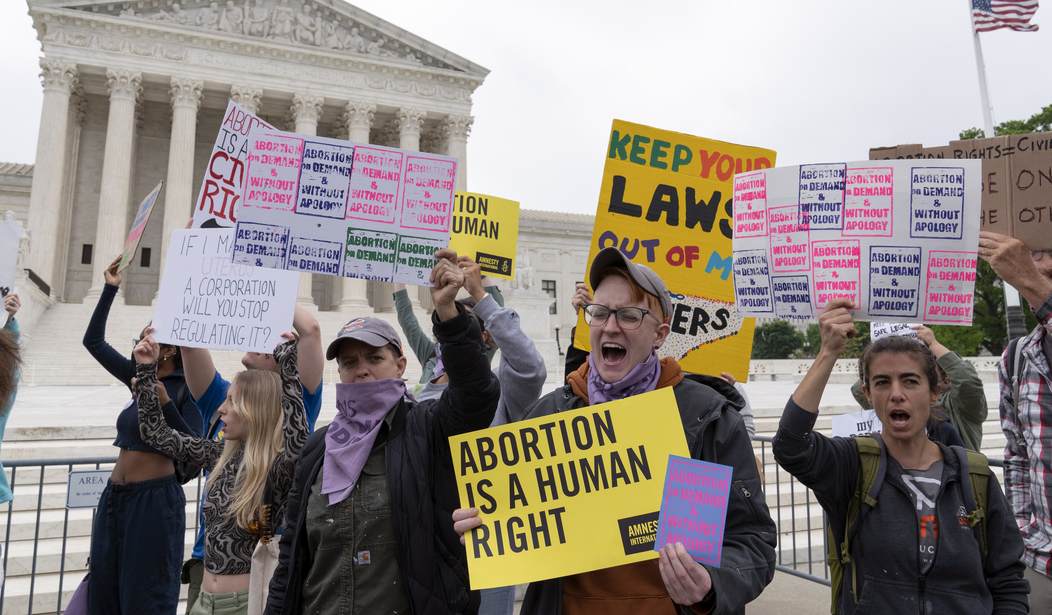The 1973 Roe v. Wade decision was one of the most ill-advised Supreme Court decisions in history, right up there with Dred Scott and Plessy v. Ferguson. It gave the least democratic branch of government the power to settle a question that would have been far better decided by state legislatures or the U.S. Congress. And because it remained unresolved, Roe launched a culture war that’s been raging for almost half a century. This war has radicalized the extremes in both parties, giving them power far beyond their numbers.
Now it appears that Justice Alito has fulfilled the dreams of the most conservative pro-life advocates by essentially turning back the clock and making abortion a matter for state legislatures to regulate. The problem is that America is 50 years older since the original Roe v. Wade decision was handed down.
Related: The SCOTUS Leak Could Be the Miracle Democrats Were Hoping For
Are we really the same country? Bret Stephens, writing the most thoughtful analysis on the right I’ve yet read, says no.
But a half-century is a long time. America is a different place, with most of its population born after Roe was decided. And a decision to overturn Roe — which the court seems poised to do, according to the leak of a draft of a majority opinion from Justice Samuel Alito — would do more to replicate Roe’s damage than to reverse it.
It would be a radical, not conservative, choice.
Stephens’ definition of “conservatism” may not suit many of today’s right-wingers. But it resonates with those of us who pine for an America of consensus and compromise.
What is conservative? It is, above all, the conviction that abrupt and profound changes to established laws and common expectations are utterly destructive to respect for the law and the institutions established to uphold it — especially when those changes are instigated from above, with neither democratic consent nor broad consensus.
This is partly a matter of stare decisis, but not just that. As conservatives, you are philosophically bound to give considerable weight to judicial precedents, particularly when they have been ratified and refined — as Roe was by the 1992 Planned Parenthood v. Casey decision — over a long period. The fact that Casey somewhat altered the original scheme of Roe, a point Justice Alito makes much of in his draft opinion, doesn’t change the fact that the court broadly upheld the right to an abortion. “Casey is precedent on precedent,” as Justice Kavanaugh aptly put it in his confirmation hearing.
You’re either a constitutionalist or you’re not. And that means paying homage to “originalism,” which includes a respect for tradition — and precedent. Alito’s decision spits in the face of precedent.
Many may feel it’s justified, considering what’s at stake. But we can’t lose sight of its effect on the institution of the Supreme Court. This is why overturning Roe is “radical.”
It’s also a matter of originalism. “To avoid an arbitrary discretion in the courts,” Alexander Hamilton wrote in Federalist No. 78, “it is indispensable that they” — the judges — “should be bound down by strict rules and precedents, which serve to define and point out their duty in every particular case that comes before them.” Hamilton understood then what many of today’s originalists ignore, which is that the core purpose of the courts isn’t to engage in (unavoidably selective) textual exegetics to arrive at preferred conclusions. It’s to avoid an arbitrary discretion — to resist the temptation to seek to reshape the entire moral landscape of a vast society based on the preferences of two or three people at a single moment.
Ending Roe will not end legalized abortion. And while the immediate political impact will likely be minimal, no one can say how impactful the Dobbs decision will be going forward.
Alito’s decision will damage the court’s position as an island in the storm of the culture wars. In the past, the Supreme Court has been careful to rule narrowly on cultural issues, trying to shape a consensus rather than definitively answer thorny questions.
But the security breach that gave us this draft decision is a small indication of what’s to come. As Stephens points out, “A court that betrays the trust of Americans on an issue that affects so many, so personally, will lose their trust on every other issue as well.” We’re likely to see other means to intimidate and threaten the justices on both sides, as the Supreme Court has now become just another political battleground.










Join the conversation as a VIP Member